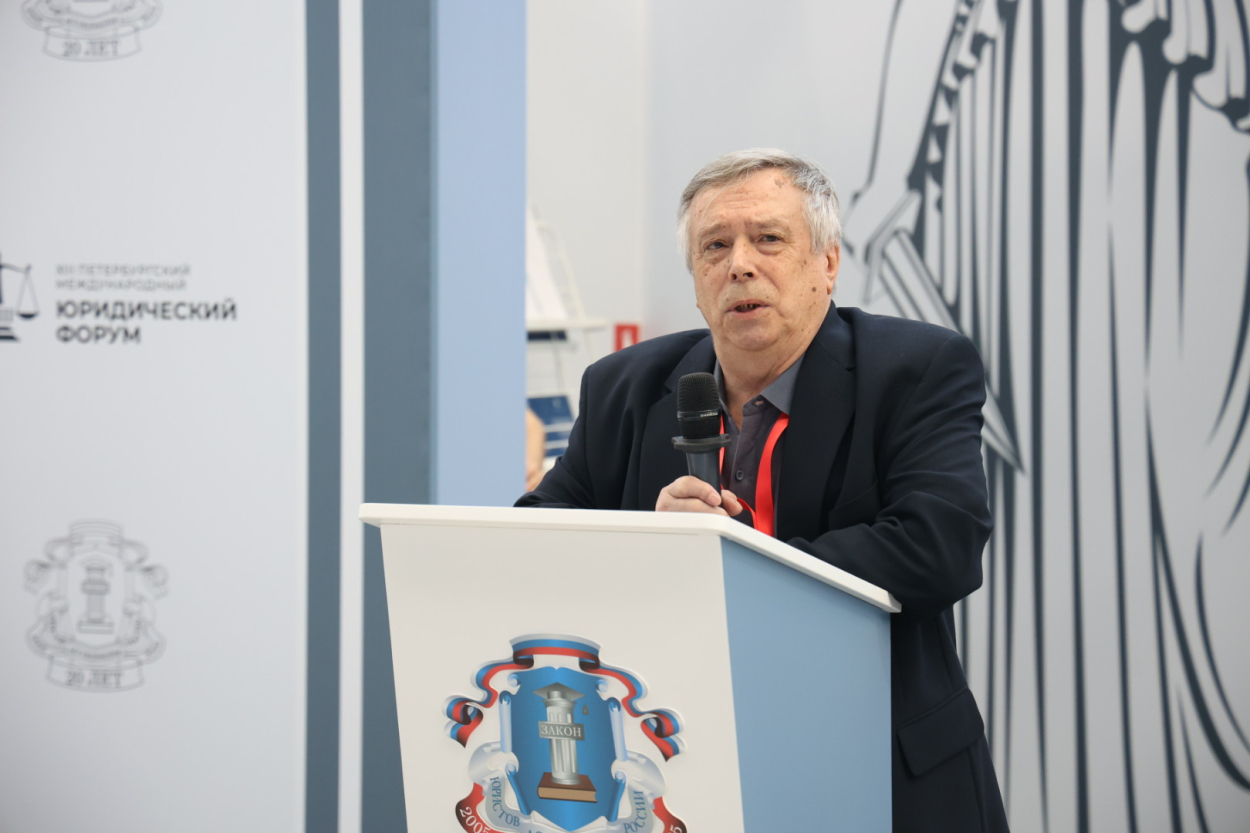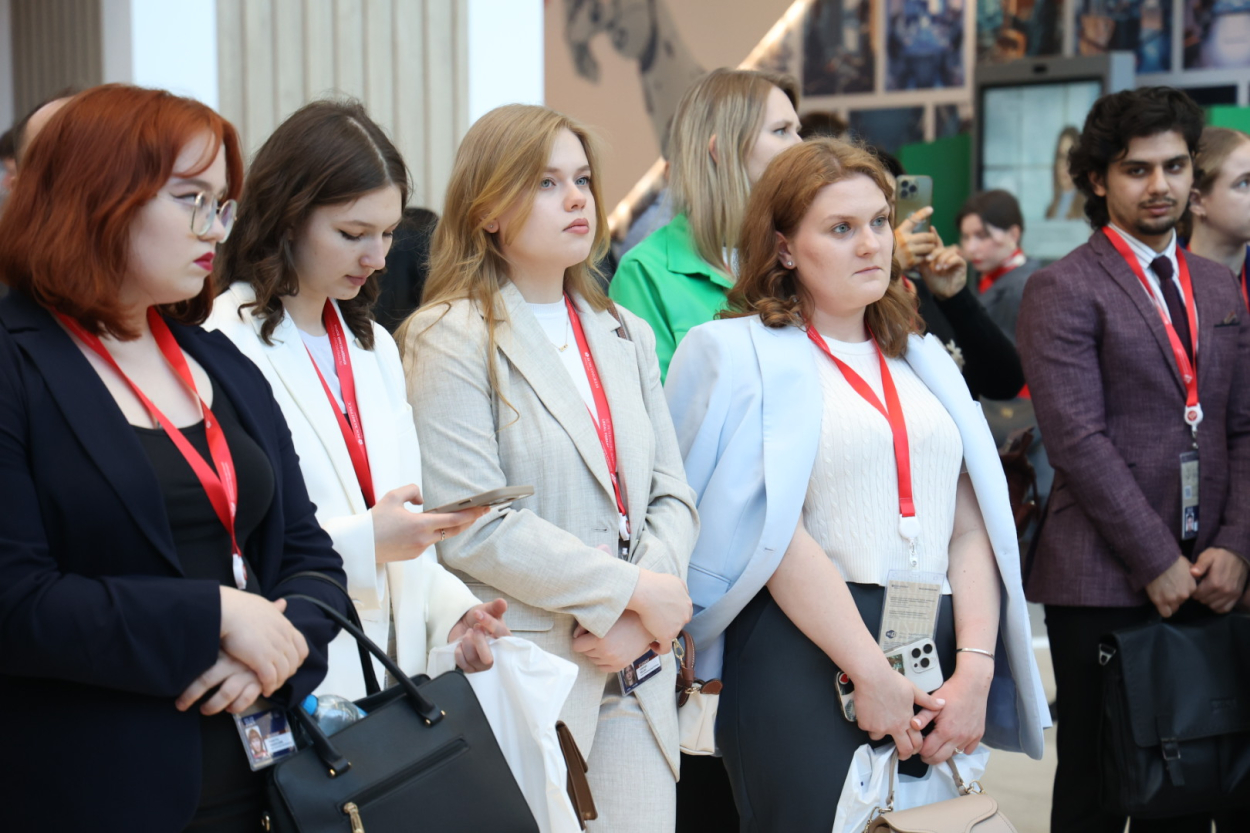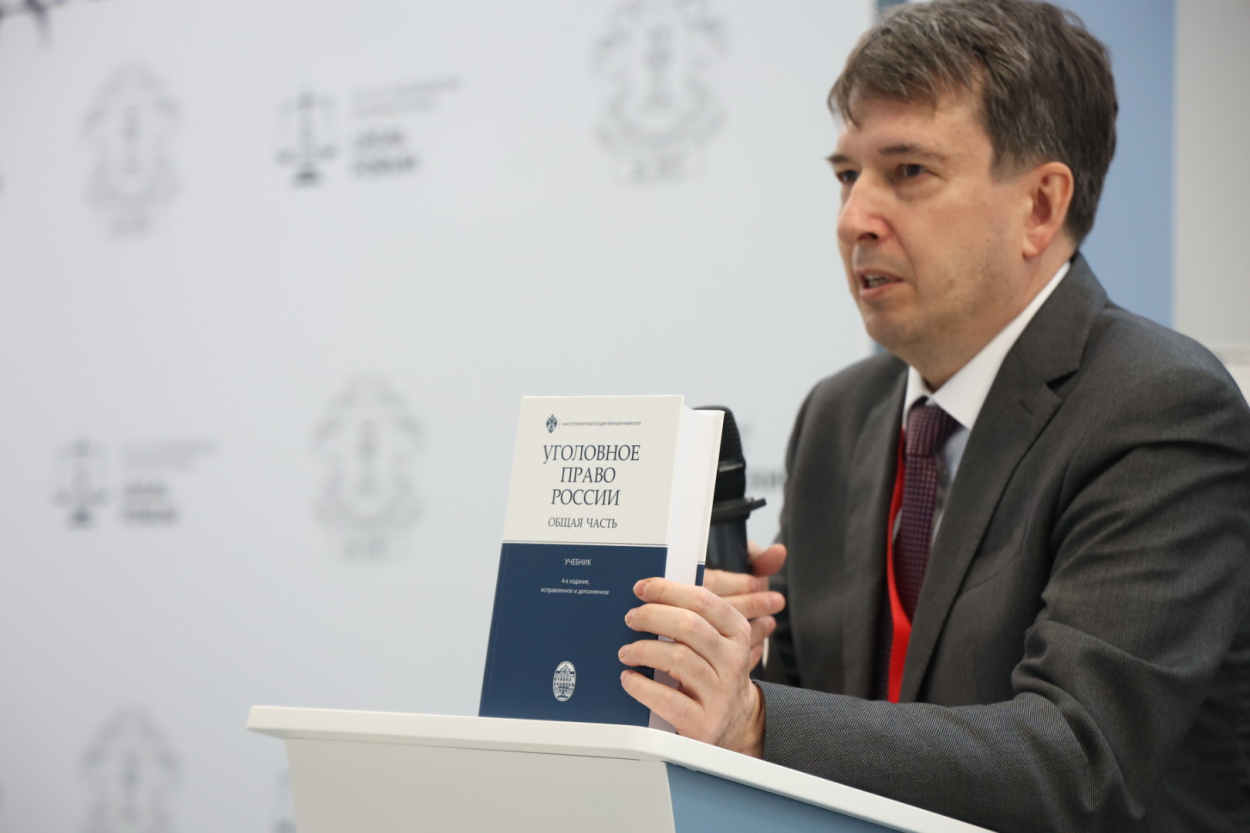St Petersburg University’s scientific journal that published an article by Dmitry Medvedev, Deputy Chairman of the Russian Security Council, presents at the St Petersburg International Legal Forum
During the St Petersburg International Legal Forum, there was a presentation of textbooks and scientific journals published by the St Petersburg University Publishing House. Among the publications is one of the most authoritative periodicals in the field of jurisprudence — St Petersburg University’s journal ‘Pravovedenie’.
According to Sergei Belov, Dean of the Faculty of Law at St Petersburg University, the University’s scientific journal ‘Pravovedenie’ focuses on fundamental theoretical issues in legal science and practice. The journal is known for its interdisciplinary and inter-branch approach.
The journal ‘Pravovedenie’ has been published since 1958 and is one of the longest-running scientific periodicals in the country. One of the main editorial requirements for submissions is the inclusion of topics within the international scientific discourse. It was in this journal that the article ‘Lost Illusions, or How the International Criminal Court has become a legal nonentity’ by Dmitry Medvedev, Deputy Chairman of the Security Council of the Russian Federation and Chairman of the Board of Trustees of St Petersburg University, was published in Russian, English, and Chinese. While submitted papers are typically published in either Russian or English, this article was published in three languages simultaneously — a unique case for us. The article is particularly relevant to those interested in contemporary international politics and international criminal law.
Sergei Belov, Dean of the Faculty of Law at St Petersburg University
Another publication by the St Petersburg University Publishing House, Vestnik of Saint Petersburg University. Law, was introduced at the Forum by Nikolay Stoyko, Professor in the Department of Criminal Procedure and Criminal Investigations at St Petersburg University and Editor-in-Chief of the journal. He emphasised that the journal positions itself as an international publication. ‘In 2015, we were given the task of entering international scientometric databases, and we have achieved this goal,’ he noted. The journal is now indexed in the Web of Science (ESCI), Scopus, RSCI, HeinOnline, EBSCO, eLIBRARY.ru, EastView, CyberLeninka, and other research databases.
‘Vestnik of Saint Petersburg University.Law’ is also recognised among the leading peer-reviewed academic sources recommended by the Higher Assessment Committee of the Ministry of Science and Higher Education of the Russian Federation for publishing key scientific results of dissertations for advanced academic degrees, such as Doctor of Law and Candidate of Law. The journal publishes articles not only from law professors at St Petersburg University but also accepts undergraduate and postgraduate papers based on original empirical research results.
Forum participants had the opportunity to explore new textbooks published by scholars from St Petersburg University. One example is the textbook ‘Criminology’ (3rd edition), edited by Nikolay Kropachev, Rector of St Petersburg University, and Vladimir Burlakov, Professor in the Department of Criminal Law at St Petersburg University. This textbook is based on the Federal State Educational Standard programme in Criminology. Unlike other similar publications, it not only includes extensive theoretical material but also features a section designed for the practical consolidation of the knowledge students acquire. It includes control questions and self-assessment tests, enabling students to prepare effectively for their final assessments. Additionally, the textbook is equipped with a glossary of criminological concepts, helping students quickly orient themselves within specific topics. This publication aims to develop criminological thinking in future lawyers. It helps to form scientifically grounded views on crime as a negative, objectively conditioned social phenomenon. It familiarises students with modern crime deterrence strategies, where punishment is not the highest priority, and prepares them to make competent decisions regarding professional challenges. According to Vladimir Burlakov, Professor in the Department of Criminal Law at St Petersburg University, criminological knowledge is crucial not only for addressing criminal law issues but also for analysing environmental, civil law, and international law issues. The textbook is authored by professors from the Department of Criminal Law at St Petersburg University, along with experts from the St Petersburg Law Institute (a branch of the University of the Prosecutor’s Office of the Russian Federation) and the Herzen State Pedagogical University of Russia.
Quod licet Iovi, non licet bovi. The world is changing, and not always for the better. We are witnessing the rapid degeneration of many supranational legal structures that have become dependent on the will, finances, and value system of the so-called collective West. A prime example is the International Criminal Court (ICC, also known as The Hague Criminal Court, hereinafter referred to as the Court). The good intentions expressed by its founders two and a half decades ago have clearly paved the road to hell. As time goes on, this reality becomes increasingly evident. This is regrettable but, unfortunately, rather predictable. One need only recall the history of this legal institution, which in a relatively short period has evolved from being seemingly necessary to complete uselessness, bordering on absurdity, bias, and cynicism. It is crucial to understand the rationale behind the current decisions of the International Criminal Court, how to respond to them, and what should eventually replace this international body, which has so quickly compromised itself.
An excerpt of the article by Dmitry Medvedev, Deputy Chairman of the Security Council of the Russian Federation and Chairman of the Board of Trustees of St Petersburg University, published in the St Petersburg University’s scientific journal Pravovedenie
SPbU alumni Dmitry Medvedev's official Telegram channel is also available in English.
The textbook ‘Russian Criminal Law. General Part’ (4th edition) was edited by Nikolay Kropachev, Rector of St Petersburg University; Nadezhda Priakhina, Associate Professor in the Department of Criminal Law at St Petersburg University; and Vladislav Shchepelkov, Professor in the Department of Criminal Law at St Petersburg University. The book combines a fresh perspective on certain theoretical and law enforcement issues with the classical criminal law doctrine. This doctrine has been developed and upheld by the St Petersburg school of criminal law.
‘The team of authors believes it is essential that law textbooks should be reprinted at least every five years, particularly considering the extensive changes in criminal legislation in recent years. For instance, in 2023-2024 alone, 35 federal laws amending the Criminal Code of the Russian Federation were adopted. In this respect, approximately 3 to 3.5 years after the last edition, the authors begin updating and supplementing the text of the chapters they wrote. Sections requiring revision, but lacking an active author for any reason, are assigned to new authors. The text is updated based on current court practices and the authors’ research findings. Additionally, approaches to identified challenges in modern monographs and leading periodicals are analysed,’ stated Vladislav Shchepelkov, Professor in the Department of Criminal Law at St Petersburg University.
The textbook is designed to meet the needs of students at various levels, from the University applicants and first-year bachelor’s students to fourth-year senior students and those enrolled in the master’s programme ‘Criminal Law’. Each chapter presents different authors’ perspectives on the most debated issues, with references to research publications in scientific periodicals, monographs, textbooks, and manuals, including those published overseas. These references supplement the recommended literature lists for self-study, enabling a deeper understanding of the issues and providing a necessary foundation for writing term papers and graduation projects. The described law enforcement issues are consistently illustrated with examples from court practice, including detailed case information. This enables students to independently review the full text of judicial acts, analyse them, and apply this knowledge in their own studies and research. The textbook Russian ‘Criminal Law: General Part is supplemented by the educational and methodological handbook 'Russian Criminal Law. General Part. Workbook’. The workbook helps to consolidate the acquired theoretical knowledge through solving cases compiled from court practice materials.
The St Petersburg International Legal Forum is the largest platform for dialogue among representatives of the legal, business, political, and law enforcement communities. It focuses on legal issues that impact citizens and businesses, aiming to improve law enforcement practices and promote legislative initiatives. These initiatives are designed to develop legal culture and regulate the socio-economic sphere under current conditions.






